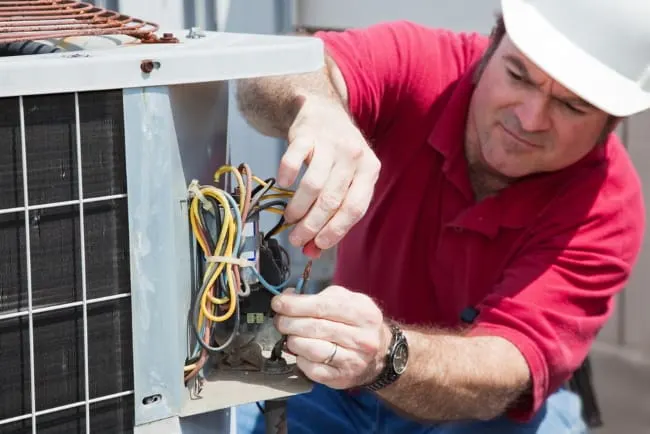
According to the US Department of Energy, 70% of residential HVAC systems are performing below standard. However, your HVAC system is one of the most important components of your home and needs to be serviced regularly to circulate clean, allergen-free air for your family.
When Dads Should Call an Experienced HVAC Technician
You may be tempted to service your entire HVAC system, but that’s a really (underline really) bad idea. A simple mistake could cause a fatal electric shock, fires or explosions from gas, or poisoning from carbon monoxide. You also run the risk of voiding your HVAC systems warranty.
Even if you don’t get hurt, you could make the problem worse. Always call an HVAC repair company, like ARS, if your system is noisy, won’t blow air at the right temperature, or smells bad (musty or like rotten eggs). Rapid cycling and water leaks should be serviced by experts.
How Dads Can DIY Their Way to HVAC Repair and Upkeep
It’s recommended to call an HVAC or plumbing company two times a year to inspect your HVAC systems. In between those appointments, Dads can use DIY techniques for HVAC upkeep.
Thermostat: Battery, Dust, and Temperature
The thermostat is the central control point for your HVAC system and will affect the temperature in your home if it isn’t inspected. Fortunately, thermostats are simple to maintain. First, check the battery. Thermostat batteries last up to 2 years on average, so change it if the battery is low.
Next, clean the dust and debris from your thermostat. A q-tip, can of air, or small brush can take care of the problem quickly. Finally, test your heating and cooling functions. Check if they’re working correctly. If it takes longer than 5-7 minutes for your furnace to turn on, call a tech.
Outdoor Unit: Debris, Fins, and Leveling
Most HVAC units are “split systems,” meaning their components are found inside and outside the home. If you have an outdoor unit, it can be found behind or on the side of the house on a concrete slab. Be sure to turn off the power to the indoor and outdoor units before the next step.
Dads should remove any debris in the fan cage, around the unit, and over the equipment. Have three feet of clearance to improve airflow to the unit. Then, clean and clear the fins by opening the unit and using a hose. Once done, check if the unit is leveled. If it isn’t, get an expert to help.
Indoor Unit: Evaporator Coil and Drain
The indoor unit consists of a furnace and an evaporator. You’ll find your unit in the attic, utility closet, or basement. You can clean the evaporator coil and drain if the HVAC unit is shut off.
With a socket wrench, remove the panel on the air handler unit. You’ll see the evaporator coil. If it’s dirty, use a no-rinse foam cleaner to clean it, so it can liquefy and rinse itself. Close to the coil is the evaporator drain. Use a shop vacuum or specialty cleaner to clear any blockages.
Indoor Vents: Blockages and Air Filters
As a rule, you should replace your home’s air filters every 90 days, but you may need to change them more frequently if you have pets, allergies, or live in a city with poor air quality.
Changing your filter is really easy and affordable. Just pop out the old filter and replace it with a new one. While you’re at it, check out the vents in your home. If they’re dirty, clean them with soap or water. If you can remove your vents, use a flashlight to check for any blockages.
- Sagittarius Man & Gemini Woman Love and Sex Compatibility - January 31, 2024
- Taurus Ascendant Rising Personality Traits in Men (Guide) - January 31, 2024
- How to Seduce and Attract a Sagittarius Man (Seduction Tips) - January 31, 2024
